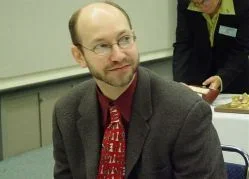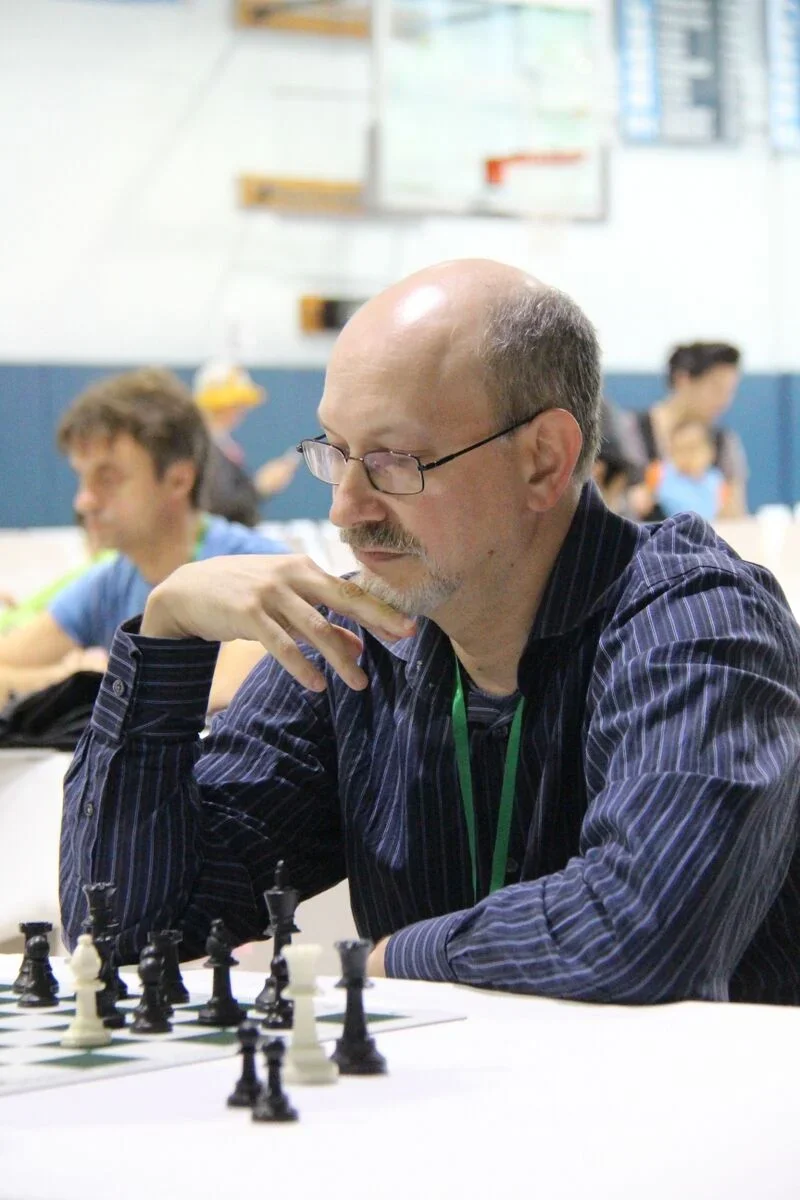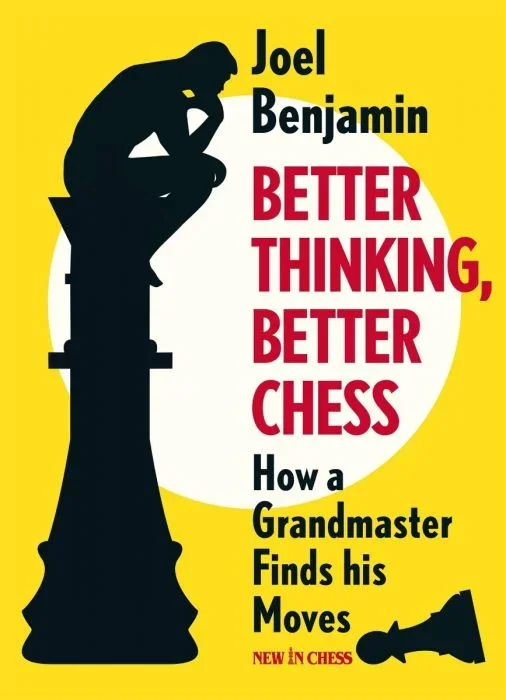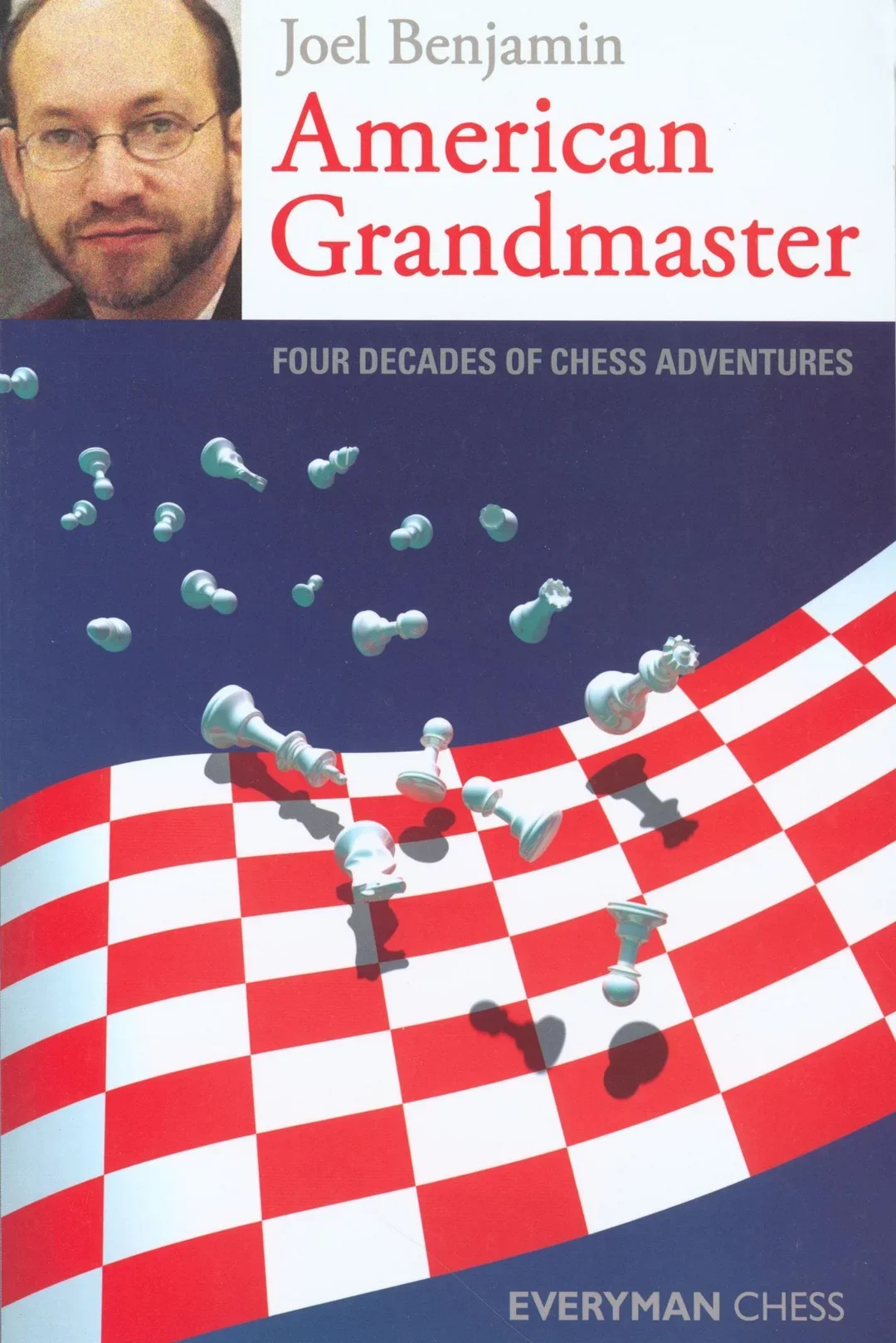The March 2019 issue of Chess Life contains a review of GM Joel Benjamin's new book from New in Chess, Better Thinking, Better Chess: How a Grandmaster Finds his Moves. Joel was kind enough to sit for an interview with CLO about the book, its lessons, and his future writing plans.
CLO: Better Thinking, Better Chess is your fourth book. Why did you start writing books, and why did you write this one? Benjamin: I wrote Unorthodox Openings on Eric Schiller's suggestion, but I was in the mode of professional playing back then. When I wrote American Grandmaster, I was semi-retired, married with children on the horizon, and I wanted to tell my story. In the last few years writing books has become a more serious pursuit for me. I wrote Liquidation [Liquidation in the Endgame – ed] because I became fascinated with a number of endings I had come across. Better Thinking comes largely out of my experience teaching classes, camps, and private students. I've learned that it's not just about what you know, but about being able to apply the knowledge in games. So I hoped to help people calculate more logically and work harder and more efficiently in their games. CLO: What was the process like? How long did it take to write the book, and what does a typical writing day look like for you? Benjamin: The length of time it takes to write a book generally fits in with the amount of time the publisher suggests when you sign the contract. I would say about six months. But the experience with this book was a bit unusual, because I had something in my head that was difficult to define. So there were a few discussions with Allard Hoogland over time about the project before I convinced him that I had a good book in my head. But we didn't know what to call it, and in fact did not come up with a title until after the book was finished. CLO: The basic thrust of Better Thinking seems to be diagnostic. Players have trouble over the board not because they lack specific knowledge, but because of flaws in their thinking process. What are some concrete tips CLO readers might take away from reading your book? Benjamin: One thing that came across to me over and over again is that players rarely make mistakes based on long variations. It's usually something they missed early on. Very often even strong players play the first move they think of without considering other, potentially stronger moves. Or they think they know what an opponent's response will be, and don't look a little longer to find another possible idea. Or they don't recognize moments when tactics are happening, or have a sense of danger to suggest to them to think longer or calculate more deeply. In keeping with the educational nature of the book, I have a chapter at the end that details the various tips that correspond to the concrete examples in the book. CLO: There’s no escaping the influence of our 'metal friends' in modern chess. You talk fairly extensively about engines in Better Thinking, and you argue that "many players extract the wrong messages from engine analysis." (9) How so? What do best practices for engine and database use look like? Benjamin: First of all, people have to know the difference between missing a tactical opportunity and a move that the engine simply gives a higher score without any obvious reason. Then we have to take practical considerations into account. You want to play the best move that you understand. If you play a move that gives you a big advantage that you know what to do with, it's better than playing a move the engine shows is strong that you can't work out. You would just put huge pressure on yourself to come up with a difficult move or moves down the line. This practical reality doesn't come across in numbers or symbology. But you often see kibitzers watching grandmaster games and talking about moves that were "missed" when the grandmaster just found a simple way to win and had no reason to take a risk. Also, be very careful with engines in endgames. If four or five different moves give the same evaluation, but don't seem to lead anywhere, that means the computer isn't seeing progress. CLO: You say in the Acknowledgements that you didn’t consult other books or sources when writing yours. Why did you adopt this strategy? Has any chess literature contributed to your understanding of best practices for in-game thought processes? Benjamin: When I wrote Liquidation, I consulted other endgame books because I didn't want to miss any good examples. Everybody's engines come up with the same analysis, and I could just explain in my own way. But here, the overall concept is rather amorphous, and I wanted to take it in the direction that seemed natural for me. It was also less necessary to consult other books because almost all the source material came from my games or games of my students, with a few games ripped from the headlines off contemporary websites. The ideas all came out of my own playing and teaching experience, so there was no need to look elsewhere. I knew there would be some unconscious overlap in themes and ideas, but things that are common sense are going to be repeated. In his complimentary New in Chess review, Matthew Sadler mentioned some of these common sense ideas, and David Navara referenced them in a letter to the editor. First of all, I'm happy to see these great GMs talking about my book, but also they reinforce the idea that good ideas are always worth repeating. I think that the overall presentation of all these ideas together in this format, however, is pretty unique. I read Think Like a Grandmaster when I was a kid, but very few books that might be related to this topic. I confess I haven't read that much since my childhood. CLO: How has writing this book affected your own in-game thinking? Benjamin: Interesting question! I would say now that writing is essentially the main thing I do, every game I play, or for that matter see, I evaluate for its possible educational or entertainment value. But I confess that knowing what you should or shouldn't do doesn't mean you get it right. The answer is probably not really, though I could say better when I get back to a more frequent level of play than I'm at currently. CLO: Slightly longer question: Appearing on the Perpetual Chess Podcast, you said (beginning at about the five minute mark): "Every chess player is different, and this, for me, this is the major part of my teaching philosophy.. it’s very much in contrast to the Soviet style of teaching, where the coach just presents material and tells the student how terrible they are, that they don’t understand anything." This surprised me. On my read, one of the strengths of Better Thinking is its cataloging of mistakes typical to players of all strengths and styles. Your discussion of candidate moves, the need to 'aim high,' and calculative accuracy wouldn’t seem out of place (bracketing tone and level of difficulty) in something from Aagaard or Dvoretsky, or even Hertan. Do you see what you’re doing in Better Thinking as fundamentally different than what they’re doing? If so, why? Benjamin: I always look for universal truths that apply to everybody. The comment is more about working with individuals more than writing. I've had students describe coaching sessions with other trainers very much in the way I put it in the podcast. When I work with students, I ask for them to send me a bunch of games at the outset so I can learn what kind of player they are, and what they need to learn. I like to tailor material I teach to what their needs are. When I go over games, it's not so much Xs and Os - the engine can do that for them - but thinking of advice I can extract from their games that will help them correct their weaknesses and play to their strengths. I will criticize in a fair way, but I'm always mindful that you don't help things by tearing down their psyche. Also, I rarely assign openings or spoon-feed opening variations to students on any level. They need to learn how to fish. Addendum: …my thoughts on individuality come out in subtle ways in the book. In a game you reference in your review...
[pgn] [Event "Marshall Sunday G45"] [Site "?"] [Date "2017.08.31"] [White "IM Jay Bonin"] [Black "Benjamin Medina"] [Result "*"] [ECO "D60"] [WhiteElo "2369"] [BlackElo "2037"] [Annotator "Benjamin"] [PlyCount "33"] [EventDate "2017.??.??"] [SourceDate "2019.02.11"] 1. d4 d5 2. Nf3 Nf6 3. c4 c6 4. Qb3 e6 5. Bg5 Be7 6. Nc3 O-O 7. e3 Nbd7 8. Rd1 {[#]} Qb6 (8... dxc4 9. Bxc4 Nd5) (8... Ne4 9. Bxe7 Qxe7 10. Bd3 Nxc3 11. Qxc3 dxc4 12. Bxc4 (12. Qxc4 e5) 12... b6) (8... b6 9. Bd3 Bb7 10. O-O c5) (8... a6 9. Bd3 dxc4 (9... b5 10. cxd5 cxd5) 10. Bxc4 (10. Qxc4 b5 11. Qxc6 Ra7) 10... b5) 9. Qc2 dxc4 10. Bxc4 Re8 11. O-O c5 12. d5 exd5 13. Bxd5 Qc7 14. Bf4 Qa5 15. Bxf7+ Kxf7 16. Ng5+ Kg8 17. Qb3+ * [/pgn]
...I talk about several plans that my student could have utilized in the opening. The idea is that he could have chosen any one that felt right, indeed one which his existing knowledge would have drawn him to. The universal truth is you must use plans in the opening, but you still have your choice how you want to apply them. CLO: Two final questions: What kind of feedback have you gotten from readers? [and] What’s the next writing project (after the revised version of Liquidation)? Benjamin: The response has been very positive. Of course, people are not likely to say uncomplimentary things to my face... but the formal reviews have been very favorable and sales are going well. I've actually reread this book several times, and each time I'm happy with what I wrote. My publisher told me that it is an "outstanding book that will sell for years to come." That really made me feel great, coming from someone who is able to compare it to all the other books out there. I think I will write some books geared to children. Better Thinking has a lot of great stuff for kids, but the language is complicated for the youngest players. Given that I have much experience working with kids, I know I can write well for them, and hopefully, provide something that's a little different from what's out there. I may also dabble in chess videos, which I haven't done outside of my job with the Internet Chess Club. That may give me a chance to get stuff out there faster, and hopefully earn a little faster as well.
Categories
Archives
- January 2026 (11)
- December 2025 (27)
- November 2025 (29)
- October 2025 (39)
- September 2025 (27)
- August 2025 (29)
- July 2025 (43)
- June 2025 (25)
- May 2025 (24)
- April 2025 (29)
- March 2025 (29)
- February 2025 (20)
- January 2025 (24)
- December 2024 (34)
- November 2024 (18)
- October 2024 (35)
- September 2024 (23)
- August 2024 (27)
- July 2024 (44)
- June 2024 (27)
- May 2024 (31)
- April 2024 (51)
- March 2024 (34)
- February 2024 (25)
- January 2024 (26)
- December 2023 (29)
- November 2023 (26)
- October 2023 (37)
- September 2023 (27)
- August 2023 (37)
- July 2023 (47)
- June 2023 (33)
- May 2023 (37)
- April 2023 (45)
- March 2023 (37)
- February 2023 (28)
- January 2023 (31)
- December 2022 (23)
- November 2022 (32)
- October 2022 (31)
- September 2022 (19)
- August 2022 (39)
- July 2022 (32)
- June 2022 (35)
- May 2022 (21)
- April 2022 (31)
- March 2022 (33)
- February 2022 (21)
- January 2022 (27)
- December 2021 (36)
- November 2021 (34)
- October 2021 (25)
- September 2021 (25)
- August 2021 (41)
- July 2021 (36)
- June 2021 (29)
- May 2021 (29)
- April 2021 (31)
- March 2021 (33)
- February 2021 (28)
- January 2021 (29)
- December 2020 (38)
- November 2020 (40)
- October 2020 (41)
- September 2020 (35)
- August 2020 (38)
- July 2020 (36)
- June 2020 (46)
- May 2020 (42)
- April 2020 (37)
- March 2020 (60)
- February 2020 (38)
- January 2020 (45)
- December 2019 (34)
- November 2019 (35)
- October 2019 (42)
- September 2019 (45)
- August 2019 (56)
- July 2019 (44)
- June 2019 (35)
- May 2019 (40)
- April 2019 (48)
- March 2019 (61)
- February 2019 (39)
- January 2019 (30)
- December 2018 (29)
- November 2018 (51)
- October 2018 (45)
- September 2018 (29)
- August 2018 (49)
- July 2018 (35)
- June 2018 (31)
- May 2018 (39)
- April 2018 (31)
- March 2018 (26)
- February 2018 (33)
- January 2018 (30)
- December 2017 (26)
- November 2017 (24)
- October 2017 (30)
- September 2017 (30)
- August 2017 (31)
- July 2017 (28)
- June 2017 (32)
- May 2017 (26)
- April 2017 (37)
- March 2017 (28)
- February 2017 (30)
- January 2017 (27)
- December 2016 (29)
- November 2016 (24)
- October 2016 (32)
- September 2016 (31)
- August 2016 (27)
- July 2016 (24)
- June 2016 (26)
- May 2016 (19)
- April 2016 (30)
- March 2016 (36)
- February 2016 (28)
- January 2016 (32)
- December 2015 (26)
- November 2015 (23)
- October 2015 (16)
- September 2015 (28)
- August 2015 (28)
- July 2015 (6)
- June 2015 (1)
- May 2015 (2)
- April 2015 (1)
- February 2015 (3)
- January 2015 (1)
- December 2014 (1)
- July 2010 (1)
- October 1991 (1)
- August 1989 (1)
- January 1988 (1)
- December 1983 (1)











